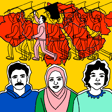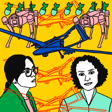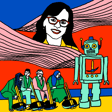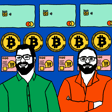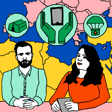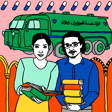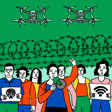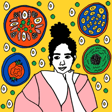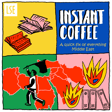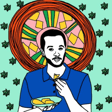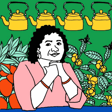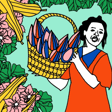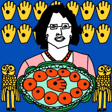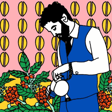Become a Creator today!Start creating today - Share your story with the world!
Start for free
00:00:00
00:00:01

2.6 Behind 'The Iranian Vegan' with Mana Shamshiri
In this episode, we speak about veganism both around the world and in Iran with Mana Shamshiri. Mana is a philosophy graduate and creator of the website and Instagram platform 'The Iranian Vegan'. She wanted to showcase the diversity of Iranian cuisine as well as provide a space for vegans of colour and those who aren't from traditionally vegan backgrounds.
Follow Mana's work here: https://www.instagram.com/theiranianvegan/ https://theiranianvegan.com/
Transcript
Introduction to Food's Cultural Impact
00:00:06
Speaker
This is season two of Instant Coffee, where we explore everything related to food in the Middle East. I'm Rivaal Seleman Haydar. And I'm Nadine Almanaski. And together we want to understand how food is shaping people's writing, thinking and organizing in the region.
Mana Shiri on 'The Iranian Vegan': Journey and Growth
00:00:25
Speaker
On this episode, we spoke with Manasham Shiri, philosophy graduate and creator of the website and Instagram platform, The Iranian Vegan.
00:00:34
Speaker
Like many of us, Mana started the Iranian Vegan as a side project at the start of lockdown. She wanted to create a platform to showcase the diversity of Iranian cuisine, as well as provide a space for vegans of colour and those who aren't from traditionally vegetarian backgrounds. 18 months later, she has gathered almost 11,000 followers and the numbers are still growing.
00:00:55
Speaker
With the rise of veganism in recent years, companies, chefs and amateur cooks have been advertising Middle Eastern food as vegan friendly. We've seen this with hamos, tabbouleh, baba renouge and many other recipes. But what about Iranian food?
Veganism's Historical Roots in Iranian Culture
00:01:09
Speaker
Was Mana returning to her roots or adapting a cuisine that heavily revolves around meat and dairy? We began by asking Mana a bit more about veganism itself and what it looks like in today's day and age.
00:01:21
Speaker
mostly it's kind of been dominated by an idea of Western veganism in the West, at least. And I think it's something that I've been very aware of and a lot of other content creators from, you know, communities of color and minority communities who live in the West have kind of been trying to raise awareness about how, for example, veganism didn't originate in the West. And there is a lot of history
00:01:47
Speaker
of veganism within our own communities and that's kind of what we've been trying to amplify and show but also show that like for example for me being vegan and Iranian can coexist and can coexist very beautifully it doesn't need to be a paradox and it isn't a paradox in fact because of this fact that it
Food as a Cultural Connection for Iranian Diaspora
00:02:06
Speaker
has
00:02:06
Speaker
you know, existed within our history for centuries. Manna's father moved to the UK when he was a teenager and her mother arrived after the Iranian revolution. Despite her parents not visiting as often, Manna makes sure to go back to Iran regularly. It's really important for me to go in a different way because
00:02:26
Speaker
It helps me understand what was all of that? What was all that noise? What were all those flavours? What was all the talk? What was all of that growing up? This is it. This is where it originates from. All of those memories that my parents talked about, this is where it all is. This is where my family is.
00:02:41
Speaker
So we definitely all do go back. But I think in general and just thinking about my Iranian community, like the adults, yeah, much less so in the recent years. As a second generation Iranian in the UK, Manah says her visits to Iran help her better understand her culture and her roots. But for many migrants, refugees and asylum seekers who have recently left their countries, the relationship to food is different.
00:03:06
Speaker
In a recent article for Getty News, Mana explores the connection between food and healing in migrant communities. It's different for me as a second-generation migrant because the way I see it, I'm kind of trying to reach out to something which is almost slipping
Food's Role in Healing for Migrants and Refugees
00:03:21
Speaker
away. And because I love it so much and I value its history and I value the richness of it so much, I'm trying to continue it despite being away from Iran. That's the way that food goes beyond sustenance for me.
00:03:35
Speaker
It goes beyond just survival because it's me understanding myself and connecting to my community. But it's also that I think on such a stronger level for migrants and refugees and asylum seekers, like first generation migrants, refugees and asylum seekers who have experienced expulsion from their land and use food as a tool to reconnect with it. So this article that I wrote with Diva Garg went into
Iran's Food Security: Inflation and Sanctions
00:04:02
Speaker
ideas about how food is really linked to feeling secure, feeling safe, feeling loved, you know, moments we share with family because food is such a social thing. For example, in Iran and other surrounding countries, they are collectivist societies rather than individualistic societies. So the group experience plays such a huge role and group happiness and group wellbeing is prioritised over the individual.
00:04:32
Speaker
them being able to cook their own food and share it with people and share those moments and remember those moments in which they were with their community. Kind of like a healing thing for them. That's what we found on this article. For example, the situation with asylum seekers is that they don't have agency over cooking and eating their own food. They have to eat what they're given. You know, I support asylum seekers and refugees and I get that a lot from them. There's so much complaint or upset about
00:05:01
Speaker
the horrible bland food that they have to eat because it's not just food, it goes so beyond that. It's just so important into making people feel at home, really. For people whose home has been ripped away from them, it's just such an important tool in healing, as I said, but in very different
Veganism in Iran: Economic and Ethical Rise
00:05:19
Speaker
ways. I recognise for me and a person who might have just arrived or has been here for a few years.
00:05:28
Speaker
It's reported that over 60% of Iranians currently live in poverty. Their wages are only enough to cover a third of their living costs. Today, the inflation rate is at 46%, up from only 10% in May 2018, when the US pulled out of the Iran nuclear deal.
00:05:48
Speaker
Ronshi Tazmini, visiting fellow at the LSE Middle East Centre, told us more about the effect this has had on food security in Iran. After the United States pulled out of the 2015 nuclear agreement and reimposed sanctions against Iran in 2018,
00:06:05
Speaker
Iran's food market has seen unprecedented inflation, which has had a serious effect on the food security of Iranian households. For the average Iranian family, it's been a struggle to keep up with rising food prices. And even in some periods, food shortages, the price of beef, chicken, dairy products, eggs, and even fruit have skyrocketed. So many Iranian households have been priced out. They simply cannot afford meat or other vital food stuffs.
00:06:35
Speaker
Even, you know, when my mum was young, my grandma, when they couldn't afford meat, she would make the same stews, the same horesh, but without the meat. So it's something that has, you know, always been there, but definitely is, is I'm seeing it and I'm hearing it more happening in Iran at the moment. I've had followers reach out to me to say this exact thing, to say like, oh, we can't afford meat. So that's why, please, can you translate your recipes into Farsi? And I'm like, yeah, of course. And that's kind of why that
00:07:05
Speaker
that came about why I started to translate my recipes into Farsi because I realised there wasn't just a need or an audience which I was trying to cater to here which was people like me and trying to reconnect with our culture but also people in Iran who are basically eating vegetarian or vegan is because they have to.
Social Media's Influence on Iranian Veganism
00:07:24
Speaker
As well as the turn to veganism through necessity, Mana also adds that there are a lot of younger Iranians becoming vegan for ethical reasons. There aren't any animal welfare regulations as such in Iran, so there is a growing movement of people who are just really interested in advocating for animal rights. And for example, the last time that I went to Iran, maybe two years ago now, I was taken to a vegan restaurant, which was literally the best vegan restaurant that I've been to.
00:07:53
Speaker
It was so nice. It was so nice. And, you know, there's like, there are options. So I can definitely see it growing there as well, which is really lovely to see. Are there other young British Iranians or other Iranians in the diaspora, for example, who are interested in what you're doing? Have they also started, do you think, exploring Iranian veganism?
00:08:16
Speaker
You know, that's what's so amazing about social media because I see them there. Like I know they exist because of social media because they follow me and they message me. We're like, we messaged each other about, about these things and the difficulties that we've had with our families and integrating and getting them to accept us. So there is a growing interest, I think, in, in young Iranians. So I'm just happy to be able to share these resources. I don't actually know any other Iranian vegans in real life.
00:08:47
Speaker
that all people who are very distant on the internet, but I'm hoping that, you know, that will grow. So you said that you became vegetarian at 15. I imagine it must have been very difficult for your parents to accept that first. Did it help at all that your sister, your older sister had been vegetarian before you and she kind of paved the way for you? She became vegetarian three years before me, also at the age of 15.
00:09:14
Speaker
I remember her coming home one day with all of these like petal leaflets like, man, look at this horror that was happening and abuse and mistreatment of animals. So I was really lucky that she kind of, she I think dealt with the difficulty of the wrath of the parents before me. But I think once I also joined her, it was a battle with our parents. At the beginning, they didn't necessarily respect what we had or the food that we wanted to eat, but
00:09:43
Speaker
To be honest, I think I'm very thankful because it was a small period before they started to understand why this was the case. But that's immediate family.
Shahnameh Tale: Meat-Eating and Sin
00:09:52
Speaker
I feel like immediate family are more loving than extended family. And to this day, to this day, every time I'm at a family gathering, Mona, why aren't you eating meat? Mona, don't you want some chicken? Mona, don't you want some meat? It'll be really good for you. Like my grandparents, my aunties, my uncles.
00:10:09
Speaker
And I'm like, you know, honestly, it's been eight years. I'm okay. I feel like if I had made that decision, I would have told you by now. I'll let you know. It is difficult for Mana's family and the older generation of Iranians to understand why she became vegan. But Mana tells us of the history of veganism in Iranian culture that goes back hundreds of years. She recalls one story from the Shahnameh.
00:10:32
Speaker
It's not an exaggeration if I say Iranians are identified by the Shahnameh. It's not only the greatest Persian epic, but also one of the greatest epic books in the world. The Shahnameh was written in about 900 years ago by Abul Qasem Ferdowsi,
00:10:53
Speaker
But it covers a long history of Persian civilization. When I say history, I don't mean the Shahnameh is a history book, no, at all. This is Ali Reza Siddiqi. He is a Persian language teacher at SAWAS, also working at the Asian and African Language Department at the British Library.
00:11:12
Speaker
After Islam came to Iran, many Iranian scholars chose to write their books in Arabic because they could have broader readers in the Islamic world. In such a time, Firdausi started to write the Shahnameh and used only pure Persian words in his work. In all nine volumes, Firdausi used less than 800 Arabic words.
00:11:41
Speaker
According to many scholars and even Persians, if Ferdowsi didn't write the Shahnameh Persian language wouldn't survive. The story is essentially about a king, his name is King Zaha and Iranians were you know vegetarians at the time and essentially the devil comes in disguise and the devil is dressed as this this chef and he's like well I want to cook you some delicious meals please will you let me? He said of course.
00:12:11
Speaker
So the chef makes him these delicious meals and day by day the dishes become even more delicious for the king and every time the devil is adding in more meat and more dairy. And the king is, he's so in love by the end of this week that he's like, how can I ever repay you to this character called Ahriman who is, you know, he's in disguise. And Ahriman says, I don't want anything, just want one thing.
00:12:38
Speaker
something very small I want you to plant a kiss on each of my shoulders just one on each side and he says okay of course I'll do that so the devil kisses him on each of his shoulders and these two black serpents come out essentially kings our heart can't get rid of these serpents these serpents are there forever
Compassionate Veganism: Philosophy and Ethics
00:12:56
Speaker
until he is alive, the serpents are alive. And a doctor, which again is the devil in disguise, tells him that the only way that he can keep himself alive and not killed by these serpents is to feed the brains of two young men from the village every single day to these serpents. And so he does that. And later in the history, there's uproar, there's protests, they take down King Zahaq and restore peace to the village.
00:13:24
Speaker
but it's a really interesting story for me about the origins of meat eating and how actually it's a sin.
00:13:31
Speaker
It's just based on greed and gluttony and it's something which was introduced by the devil. I also wanted to ask you about how you describe your work. There are a lot of terms that you use like compassion, love, honor, ethics, and you describe your food and cooking in a very emotive way. Did these ideas come with you when you adopted a vegan lifestyle or did you have this connection to cooking as a child and through your upbringing? Food.
00:13:59
Speaker
Iranian culture is just such a huge thing for our culture and the collective and the way that, for example, we show our affection or our love by feeding our guests. You always have to make too much so they can be, you know, you make sure that your guests are really, really full. You know, you always make so much effort with the food because that's a way of showing love. And that's the way that I was taught about food and what I learned food was breaking bread together, I think.
00:14:25
Speaker
um, is a really important way to, to bond. And it's something that's really present in our culture. And I think it also just adds to like a shared sense of identity and a shared sense of community. And so when I became vegan, I would, I didn't want to abandon that. And I didn't want to leave that behind. And I wanted to carry through this beautiful expression of love and connection to my culture, like being so far away from Iran and
00:14:52
Speaker
having this conflicting ideas of identity, like being an Iranian and raising such a, with such a rich and strong culture in the household. It was so important for me to continue that in terms of compassion, thinking about compassion. I think compassion is something which has always just been present within me.
Environmental Benefits of Vegan Choices
00:15:10
Speaker
I studied philosophy, you know, throughout high school, A-level University. And I think a philosophy of compassion for me is really important and trying to create the least harm in every
00:15:22
Speaker
every circumstance and every situation as much as we can, because I also recognise that not everybody has the particular privilege to be able to do that. So to the extent that we can, trying to create the least harm possible and doing the most loving thing possible in every circumstance.
00:15:36
Speaker
every situation and every circumstance. Although Mana's focus is Iran, her philosophy is universal. She encourages all to think about the origins of food. Where exactly is what we're consuming quamun from? What impact does it have on the planet, on animals and on others?
00:15:52
Speaker
From an ethical perspective, animals, I think they are so valuable. I think all life is so valuable and they don't deserve to be kind of treated in the way that we do because there is a mass demand for meat and dairy. So the way that they are treated as objects, there is no consideration for them at all. And I think their lives are devalued. And what's interesting to me is also how
00:16:22
Speaker
people, you know, if you spend a day with a cow or a pig or any animal, I guarantee that you will see that that animal has a sense of self, that animal has a sense of self, that animal has a personality, feels pain, it feels happiness, expresses emotions. And there's almost like this discrimination between animals as well. Like we love dogs, but we hate cows. So we, you know, if you if you tell the average person, maybe in this country, like would you
00:16:50
Speaker
kill and eat a dog, they're horrified. They're absolutely horrified because they've had connection with those animals and they recognise that there's someone in there. So from an ethical standpoint, I just think we can just create a lot less suffering by choosing a vegan lifestyle. And also the environment, I think, is just such an important thing at the moment. Literally, as we are all witnessing, the earth is on fire. There's no other way to put it. We're in a climate emergency. We're in a climate crisis. There was a
00:17:19
Speaker
University of Oxford study a couple of years ago which showed that one of the biggest ways that you can reduce your carbon footprint is through leading a vegan diet and that's because meat and dairy produce a very small percentage of food for a very small percentage of people in the globe but they use the largest amount of land and we could be using that land for crops that could feed a lot a lot more people and obviously because of
00:17:48
Speaker
Methane being one of the biggest emitters of CO2, it's such a powerful way that we can take
Diversity in Veganism: Cultural and Environmental Hope
00:17:54
Speaker
back power. Even though we know that corporations are the ones that are creating the most harm in this situation, we can take that power by changing our dietary choices, even if it's a little bit, I think I would encourage. But I'm just really hopeful for all of these other young vegans from different ethnic backgrounds as well.
00:18:14
Speaker
kind of diversifying the scene and letting people know that we can have our cultural foods and we can continue our heritage and we can be kind to animals and the environment and our health. Thank you for tuning into Instant Coffee, a podcast brought to you by the LSE Middle East Centre. Join us every other Tuesday for a new episode of Instant Coffee. To learn more about Mana and her work, follow the links in the podcast description.
00:18:45
Speaker
Don't forget to follow us on Instagram and subscribe to our channel wherever you get your podcasts. Please make sure to like, comment and give us five stars.
